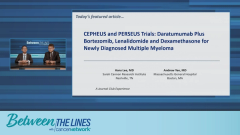
Key Takeaways/Final Comments
Panelists discuss how 4-drug regimens anchored by CD38 antibodies are becoming the standard of care in myeloma, with future directions focusing on integrating novel immunotherapies and potentially redefining the role of transplant.
Episodes in this series

The discussion concluded with reflections on the rapidly evolving treatment landscape in multiple myeloma, highlighting the strength of the emerging data in support of 4-drug regimens. With each new data release, the role of CD38-directed monoclonal antibodies as a foundation of therapy becomes more firmly established, both for transplant-eligible and ineligible patients. The studies continue to reinforce the durability and depth of responses when these regimens are used up front, making them the current standard for newly diagnosed cases.
Looking ahead, the focus is shifting toward integrating novel immunotherapies such as CAR T-cell therapy and bispecific antibodies into earlier lines of treatment. These agents, which have demonstrated remarkable activity in relapsed disease, may be poised to move into frontline settings. Additionally, the exploration of trispecific antibodies targeting multiple antigens represents the next frontier in immune-based therapy. As trials continue to investigate these approaches, the possibility of future 5- or even 6-drug combinations is becoming more realistic.
Finally, the ongoing evolution of treatment strategies may even challenge the traditional role of autologous transplant. New studies presented at this year's meeting suggest that deep responses—such as minimal residual disease negativity at high sensitivity thresholds—can be achieved without transplant in some cases. This raises exciting questions about how treatment might be adapted for individual patients. Overall, the field continues to make impressive strides, with an expanding arsenal of therapies and an increasing ability to personalize care based on disease biology and response depth. For both clinicians and patients, the future of multiple myeloma treatment appears increasingly hopeful.
Newsletter
Stay up to date on recent advances in the multidisciplinary approach to cancer.



































